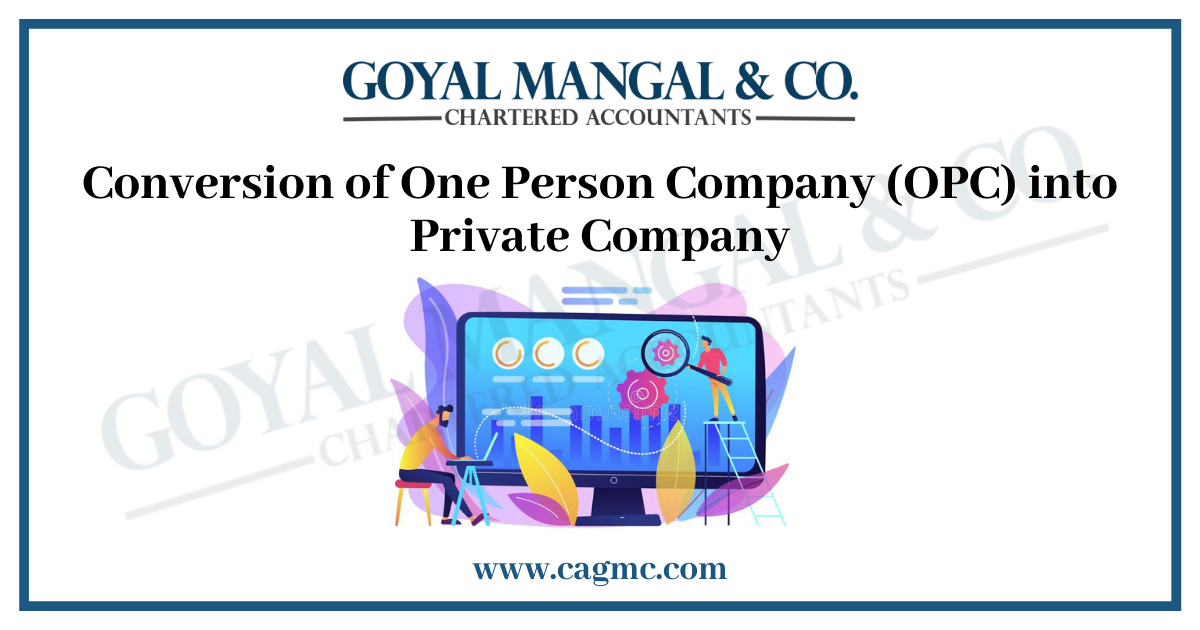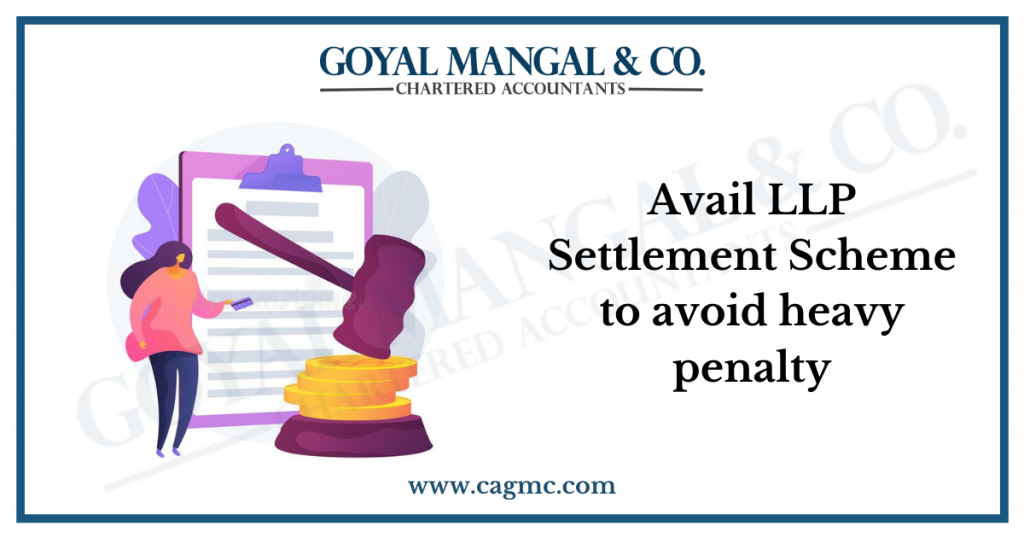
In 2013, the Companies Act introduced one person company(OPC) where a company can be incorporated by a single person. The Ministry has also laid down guidelines for the conversion of a one-person company into private limited company in the Companies (Incorporation) Second Amendment Rules, 2021. In this article, we look at the definition of one person company and the procedure for Conversion of One Person Company into Private Limited Company, and the recent amendments.
What is One Person Company (OPC)?
Section 2(62) of the Companies Act defines OPC as a company having only one member. These companies get funds easily. The Companies Act gives ample exemptions to OPCs and easy incorporation and management.
A private limited company has a minimum two-member and a maximum of 200 members. The liabilities of these members are limited to the amount of shares held by them.
Who can be a member of an OPC?
Under Companies (Incorporation) Second Amendment Rules, 2021 and Companies (Incorporation) Rules, 2014, a natural person who is an Indian citizen whether resident in India or otherwise can incorporate an OPC. He shall be the nominee for the sole member of OPC. A resident in India in this context means a person who has stayed for a period of 120 days in India during the preceding year. This natural person should not be a member of more than 1 OPC at any given time. Additionally, he should not be a nominee of more than 1 OPC. These companies cannot be incorporated or converted into section 8 companies. Neither can they carry non-banking financial investment activities.
Legal Framework for Conversion of OPC into Private Company
- Section 18 of the Companies Act, 2013, Companies (Incorporation) Rules of 2014 and Companies (Incorporation) Second Amendment Rules, 2021discuss about the conversion of one person company into private limited company. These rules don’t affect the existing liabilities of the OPC. Section 17 of the Companies Act along with Rule 7(4) of Companies (Incorporation) Rules, 2014 also discusses about the same.
- The government in April 2021 has amended the Companies (Incorporation) Rules, 2014 with Companies (Incorporation) Second Amendment Rules, 2021.
- E-form INC-6 has to be filed under section 18 of the Companies Act and Rule 7(4) of the Companies (Incorporation) Rules, 2014.
- Section 18 states that a company can convert itself into any other company by alteration of memorandum and articles. If the company converts according to this section, the applicant has to submit the application to the Registrar. The Registrar will issue the certificate of incorporation after verifying the application and documents. This registration will not affect the liabilities of the company.
- Earlier Rule 7 of the 2014 Rules prescribed that no OPC can convert voluntarily into any kind of company unless 2 years have expired from the incorporation of OPC or the threshold limit has increased to Rs. 50 Lakhs or turnover exceeded Rs. 2 crores. But now, the 2 years restriction has been removed. OPCs can freely convert into any company at any time without any limitations on the turnover or paid-up capital.
- Under the conversion, the alteration of MOA and AOA is according to Section 18 and 122 of the Companies Act. If someone wants to apply for conversion of One person company to private limited company, they need to submit form INC-6. It is mandatory for the company to obtain no objection from the members and creditors of the company. OPCs can convert to private companies after increasing the minimum number and members and directors.
Changes after Companies (Incorporation) Second Amendment Rules, 2021
- Before April 2021 Amendment there was a rule that OPCs can voluntarily convert after 2 years of incorporation into a private limited company. But it has been omitted in 2021 amendment. Now OPCs can convert into a private company anytime. They have to communicate about the conversion of one person company into private limited company in Form INC-6.
- Before the Companies (Incorporation) Second Amendment Rules came into existence, the OPCs mandatorily converted to private limited if the paid-up share capital crosses Rs. 50 Lakhs and the annual turnover for three consecutive years was beyond Rs. 2 crores. This conversion was done by passing a special resolution in a general meeting. Before the conversion, the creditors and the other members submit a no-objection certificate.
- The government has amended this provision, now there are no limitations on the growth of OPCs in India with respect to paid-up capital and turnover.
Conversion of One Person Company into Private Limited Company
Rule 6 in Companies (Incorporation) Second Amendment Rules, 2021 prescribe the Conversion of One Person Company into Private Limited Company-
- Firstly, the company has to pass the board resolution. The shareholders hold a general meeting for passing the resolution. There is a board resolution for approving the alterations in MOA and AOA in accordance with section 122(3) of the Companies Act. This gives effect to the conversion of One Person Company into Private Limited Company and to make the necessary changes.
- Secondly, the OPC has to intimate ROC about the conversion of the One Person Company into a private limited company. they have to submit a copy of the special resolution with the Registrar within 30 days of the resolution in Form No. MGT-14.
- Usually, the conversion of one person company into private company takes place after increasing the minimum number of members to 2 or 7 and minimum number of directors to 2 or 3 directors. They have to maintain a minimum paid up capital and comply with section 18 of the Companies Act for conversion.
- The company has to file an e-form INC-6 for the conversion of one person company into private limited company along with fees with the Registrar informing that it has ceased to be OPC. Moreover, they have to inform that it has converted itself into a private company.
- After the OPC fulfills all the requirements, the Registrar approves the form and issues the certificate of conversion.
Documents required for conversion of OPC into a private company
The following are the required documents to be furnished for the conversion of One Person Company into private limited company.
- The directors have to give an affidavit or NOC affirming that all the members and creditors have given the consent for conversion.
- PAN card of nominee and member of the company along with proof of identity and residential status.
- Altered MOA and AOA.
- Attested financial statement
- Copy of board resolution authorizing the notice. And the copy of the minutes.
- A list of members and creditors.
- Audited balance sheet along with the profit and loss account.
- The no-objection certificate or consent of the nominee.
How to file e-form No. INC-6 for Conversion of One Person Company into Private Limited Company?
- The applicant has to file an application for conversion of one person company into private limited company in e-form No. INC-6.
- The applicant has to give details like CIN and GLN along with the name and category of the company.
- He has to file the date of incorporation and the registered office address.
- Additionally, he has to file the existing no. of directors of the company.
- The applicant has to give the particulars of special resolution in form MGT-14.
- The applicant has to give the capital structure of the company and the number of members.
Approval of Conversion
Before proceeding further with the conversion of one person company into private limited company, the members pass the board resolution for the approval of the conversion of OPCs into private company. Additionally, the members of the company need to approve the Alteration of MOA, AOA, and conversion of company into public or private limited company.
The sole member receives an intimation about the board resolution. The director has to sign and submit e-form INC-6 for the conversion of the company.
After the approval from the directors, the shareholders receive a copy of the resolution along with the notice of passing the resolution. Upon approval by the shareholders, the board proceeds further with the application.
Effects of conversion of OPC
There is no effect of conversion of a one-person company into a private limited company. Therefore the company is liable for all its previous obligations.
Conclusion
The sole purpose of introducing OPCs in India was to boost entrepreneurship. It enables people to contribute to the economic growth of India. One Person Companies can convert to a private limited company after qualifying the criteria laid down by the Companies Act. The 2021 amendments have removed the stringent conditions associated with conversions of OPCs to cater to the growth of OPCs in India.


